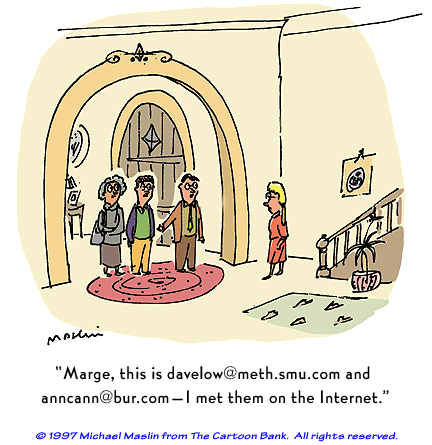Online communities have become more prominent with the increasing growth of the internet over the past ten to fifteen years. Whatever your interests or beliefs may be, there is an online community waiting for you to support their same ideas or be there for you when you may think you are a loner in that particular area. A sense of community and belonging is very important for an individual's mental state. It keeps them stable as well as provides them with a sense of comfort which is necessary to be in the back of someone's mind. Essentially, this is a type of 'support system' allowing the individual or individuals to express themselves freely without criticism from those closest to them. Fernback and Thompson (1995) write, "[Community] refers to a sense of common character, identity or interests." "Community becomes so thin because workplace and residence, production and consumption, identity and interests…." The internet has really done just the opposite for what Fernback and Thompson have expressed today's culture have done to community; it has brought back togetherness and common interest in people of all geographic locations of the world.

So where do the topics of identity and privacy fit into online community? Well, when exposed to an online community, in which one participates or belongs to, they essentially create their own identity which depends on their thoughts of privacy. One may create a pseudonym, or false name, to disguise their real identity. These pseudonyms are very important in the safety of online user's personal information. As discussed in an earlier blog, it is not very difficult to gain access to someone's credit card information, social security numbers, and so forth, if someone is trained in doing that sort of criminal activity. Therefore, people disguise their real information in hopes that it will better protect themselves from identity theft and other crimes. These disguises should not be harmful in the trickery and false leading of others however. Donath (1996) writes, "Some [forms of identity deception] are quite harmful to individuals or to the community; others are innocuous, benefiting the performer without injuring the group. Some are clearly deceptions, meant to provide a false impression; others are more subtle identity manipulations, similar to the adjustments in self-presentation we make in many real world situations." When someone has belonged to an online community for some time, and has become comfortable with the community itself, they may be prone to disclose more personal information than is necessary. It is important to not do this because online identity thefts can gain access to any website at any time if they want to. Wikipedia writes, "Regular Internet users with an eye to privacy may succeed in achieving a desirable level of privacy through careful disclosure of personal information and by avoiding spyware." Major challenges of maintaining privacy are heavily due to technology such as cookies, IP addresses, and spyware.
Principally, when exposed or part of an online community in which one feels comfortable with the information and population of the community, they protect their personal information, their identity, through certain types of privacy. What it all comes down to is trust. Do I trust this online community in which gives me support with my real name and so forth? Evaluation of trust vs. risk is the underlying message throughout the topics of online community, privacy, and identity.
References:
Donath, J. S. (1996, November, 12). Identity and Deception in the Virtual Community. Communities in Cyberspace, Retrieved April 18, 2007, from http://smg.media.mit.edu/people/Judith/Identity/IdentityDeception.html
Fernback, J., & Thompson, B. (1995). Virtual Communities: Abort, Retry, Failure?. Retrieved April 18, 2007, from http://www.rheingold.com/texts/techpolitix/VCcivil.html.
Internet privacy. (2007, April 15). In Wikipedia, The Free Encyclopedia. Retrieved 16:34, April 18, 2007, from http://en.wikipedia.org/w/index.php?title=Internet_privacy&oldid=123076810
No comments:
Post a Comment